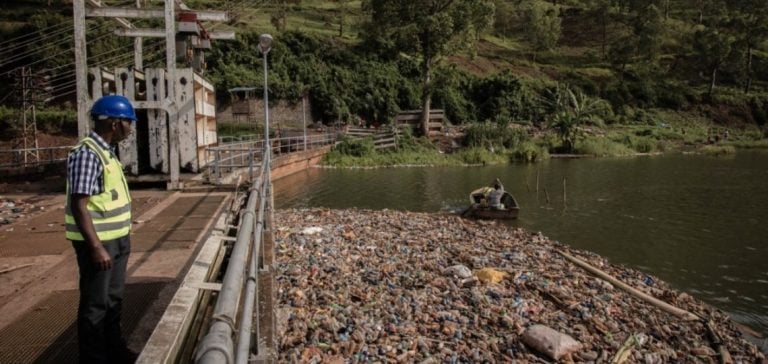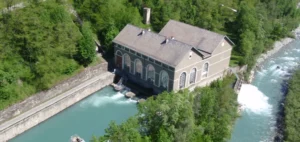The Ruzizi hydroelectric power plant, an essential pillar of electricity production for the Democratic Republic of Congo (DRC) and neighboring countries, is experiencing a significant reduction in output due to the accumulation of plastic waste.
Located in Bukavu, in the province of Sud-Kivu, this power plant is at the heart of an environmental and industrial problem that is directly affecting its operation.
Heavy rains have washed a large amount of garbage into Lake Kivu, blocking the plant’s turbines and disrupting electricity production.
Plastic waste, mainly from the city’s gutters, is transported into the lake by the rains, making its way to the power plant’s facilities.
This cyclical phenomenon, in the absence of appropriate waste management in the region, creates regular interruptions in production.
This situation further complicates access to energy in an area that is already fragile from an economic and energy point of view.
Immediate impact on production capacity
The generating capacity of the Ruzizi power station is usually 20 megawatts (MW), but with two out of four turbines currently shut down due to obstructions caused by waste, this capacity has been halved.
The remaining 10 MW are no longer sufficient to meet the electricity needs of the populations and businesses of South Kivu, North Kivu and the regions bordering Burundi.
The partial reactivation of one of the turbines has not completely restored the situation, and load shedding continues.
The absence of a lasting solution to eliminate accumulated waste is complicating maintenance operations.
Teams on site are working continuously to manually clear the turbines, but this task remains complex and inefficient in the long term.
Jovy Mulemangabo, local director of the Société Nationale d’Electricité (Snel), emphasized the need for better waste management by the local population to avoid repeated incidents of this kind.
However, without appropriate infrastructure, the prospects for improvement remain limited.
Economic and industrial consequences
This reduction in electricity production has a significant impact on the local economy.
Industrial businesses and households alike are facing prolonged power outages.
The region’s dependence on this single energy source makes each outage particularly damaging, directly impacting productivity and business activities.
In the absence of a diversified energy network, South Kivu and its neighbors face growing vulnerability.
The impact on electricity supplies is also felt beyond the borders of the DRC.
Burundi, also supplied by the Ruzizi power plant, is experiencing electricity shortages, further complicating its economic development efforts.
The slowdown in energy production is undermining industrial initiatives in these countries, exacerbating dependence on energy imports.
Infrastructure management outlook
The current situation raises questions about the management of energy infrastructures in regions heavily dependent on local resources such as hydroelectricity.
Hydroelectric power plants, although often presented as reliable and clean solutions, are being put to the test here by poorly managed environmental problems, but also by the lack of adequate maintenance of waste collection networks.
The issue therefore goes beyond the purely energy-related, and raises the question of investment in public infrastructure, particularly in developing areas.
It is also imperative to rethink the management of waste, particularly plastic waste, in the South Kivu region.
Without a formal collection system, waste continues to flow into waterways, compromising not only electricity production but also the environment and local living conditions.
If this situation is not resolved quickly, power outages could become more frequent, causing significant economic losses in the long term.
Solutions waiting to happen
Faced with this recurring problem, the Congolese authorities and those in charge of the Ruzizi hydroelectric power station are under pressure to find effective solutions.
The Ministry of the Environment declared waste management a priority in 2023, but concrete progress has been slow to materialize.
Proactive management of energy infrastructures is essential to avoid further production interruptions, especially as energy demand continues to rise in the region.
The challenge is made all the more complex by the fact that funding for such projects is often limited, and the maintenance of facilities depends on several players.
Increased public investment or private partnerships could provide possible solutions.
In the meantime, the population and businesses have to cope with reduced electricity service, increasing social and economic tensions in the region.






















